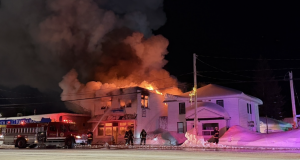Looking for something to do? Got friends visiting and not sure what to do with them? Visit Lake Superior Provincial Park and not only enjoy the spectacular scenery but learn about this unique area.
| Agawa Bay Visitor Centre | Drop-in: 10:00 AM – 12:00 PM | MEET THE NATURALIST: EVERYBODY POOPS! – Who’s scat is that? Join Faith to identify animal droppings you might see out on our trails. You’ll get a brief lesson on digestive anatomy and find out why poop looks the way it does. Also, don’t forget to scoop that poop! Learn how picking up after your pets – and yourself – is important to keeping the park safe for visitors and wildlife. |
| Agawa Bay Visitor Centre | Drop-in: 10:00 AM – 12:00 PM | JR. NATURALIST: DRAGONTALES – Our dragons don’t breathe fire and our damsels aren’t in distress, but they are just as interesting as any fairy tale! Join Meadow and Celeste to explore the exciting lives of the dragonflies and damselflies that live in Lake Superior Provincial Park. |
| Rocky Point, Agawa Bay | 1:00 PM | GUIDED HIKE: A COASTAL EXPERIENCE – Lake Superior is a powerful lake with many moods; it can be as still as glass one day and whip up a violent storm the next. Explore the coast with Anna and Michelle to learn how these powerful moods impact life along the shoreline. This short walk will begin at the southern end of Agawa Bay Campground. Please sport sturdy footwear and dress appropriately for the weather. |
| Agawa Bay Gatehouse | Drop-in: 2:00 PM – 4:00 PM | MEET THE NATURALIST: BEAR NECESSITIES – You are in bear country! Visit with Zane to learn more about these fascinating creatures and discover some tips and tricks to help you be respectful guests in their home. |
| Agawa Bay Amphitheatre | 7:00 PM | SPECIAL EVENT: LAKE SUPERIOR WATERSHED CONSERVANCY FILM – Come explore the largest freshwater lake in the world. This film screening will take you through a breathtaking journey of beautiful vistas and wildlife encounters on Lake Superior. Then, learn why the Lake Superior Watershed is vital to our lives and how we can protect this unique ecosystem for the enjoyment of future generations. |
Latest posts by Brenda Stockton (see all)
- WFD Responds to Fire on Broadway Avenue - February 12, 2026
- Hwy 17 (Wawa to Batchawana Bay) OPEN - February 11, 2026
- Tuesday Morning News – February 10 - February 10, 2026
 Wawa-news.com Local and Regional News
Wawa-news.com Local and Regional News
